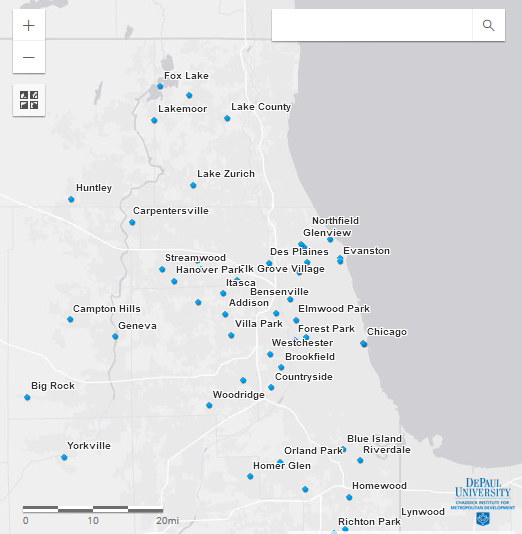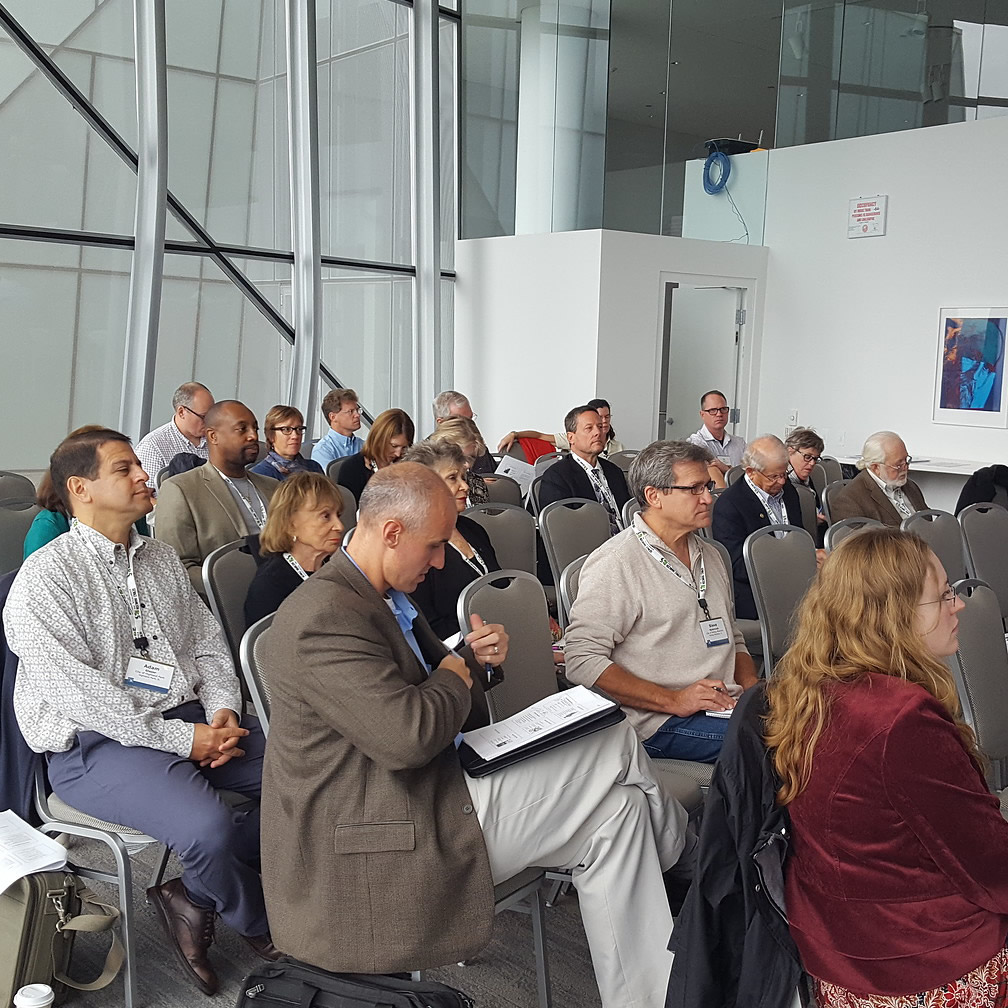 Interactive map of plan commission trainings held throughout Illinois, 2011-2017
Interactive map of plan commission trainings held throughout Illinois, 2011-2017Conducting trainings for municipal commissioners has given our entire team a deep appreciation of the hard work of these civic-minded volunteers. After several thousand miles traveling through the state to meet with small and large communities, our team has learned a great deal about the delicate issues these commissioners face and how they can come together to effectively overcome even the most complex and controversial development challenges.
Our program began in 2011, when a partnership formed between the Chaddick Institute and the
Illinois Chapter of the American Planning Association (APA-IL). The following year,
Chicago Metropolitan Agency for Planning (CMAP) joined us in order to provide training to some of the communities for which CMAP provides local technical assistance. The training program both orients municipal commissioners to the development review and approval processes and assists them with tools for addressing planning issues of local concern.
Since then, we have carried out more than 70 such plan commission workshops for communities throughout the state (
see interactive map). And while most of these trainings were designed for cities and villages, we have also provided sessions for commissioners working for county governments. We have been pleased that some communities have requested second training sessions for their commissioners.
In the paragraphs below, I offer some perspective on the design of our workshops and also reflect on the lessons we've learned through interactions with participants in past trainings.
DESIGN OF PLAN COMMISSION TRAININGS Plan commission trainings are held within the host community and last about two hours. Workshops are facilitated by two faculty volunteers drawn from a growing pool of accomplished planners, often with both municipal and private sector planning experience in Illinois.
Curriculum for commissioner training workshops cover a variety of standard and requested topics. Standard topics include the role of commissioners, hearing procedure best practices, standards of review, zoning codes, comprehensive plans and regional planning. The curriculum also encourages participant interaction.
At the conclusion of each training, commissioners complete a brief, anonymous evaluation form. Feedback from attendees helps us to identify what worked and what didn't work in order to improve future workshops. Lastly, each commissioner receives a certificate of completion thanking them for spending an educational evening with us.
LESSONS LEARNEDOur many workshops have provided us numerous opportunities to learn from participants and faculty. Compiled below are some of the more important insights we've gained from our commission trainings.
1. Make workshops easily accessible Workshops are typically held at a location and time that enables broad participation by commissioners. We've found that meeting at the municipality's village or city hall during evening hours works best. Communities often plan workshops that coincide with the appointment of several new commissioners or the combining of commissions, such as the zoning board of appeals and plan commission.
We have also expanded access to our trainings by offering an all-day session at the APA-IL conference. The session provides a unique opportunity for attendees to network with other commissioners and municipal staff from around the state and share how they have dealt with similar planning issues. In addition, some years the full-day session includes a panel discussion with various professionals involved in the development review process or conversations with chairs of local plan commissions.
At September's conference we will be incorporating a mock hearing into the training with time for commissioner participants to discuss what worked well and what could have been improved.
2. Keep the curriculum current
 Commissioners training at the 2016 APA-IL conference in Chicago (source: American Planning Association - Illinois Chapter)
Commissioners training at the 2016 APA-IL conference in Chicago (source: American Planning Association - Illinois Chapter)We continually take steps to refine training curriculum to stay current with challenges that plan commissions are likely to face. Feedback from the participant evaluation surveys mentioned above assist with this. For example, we found that several communities expressed interest in having a law component incorporated into the trainings that specifically addresses legal issues such as conflicts of interest, ex parte contacts and state laws on ethics and open meetings. Communities now have an option to incorporate such legal aspects of commission work into the workshop, provided by practicing municipal attorneys along with a planner. Other participant comments from past surveys include: "Refresher of planning and zoning topics with good mix of principles and practices"; "Our specific ordinance sections were artfully blended into the presentation"; "Clear and capable speakers who made us feel comfortable asking questions".
3. Make information locally relevant While it is important to stay current on standard procedures, laws and best practices, we acknowledge that planning is ultimately a local activity rife with local challenges and opportunities. For this reason, our presentations are tailored to local concerns based on information from municipal staff. Our trainings also include handouts with community-specific information, including the municipality's standards of review for variations and special uses, with examples of hypothetical projects to show compliance with each individual standard, as well as copies of the PowerPoint presentation.
We stress throughout the training the importance for commissioners to be knowledgeable of their community's comprehensive plan and local zoning regulations and provide guidance for how to apply them consistently. Lastly, we find new ways to work with staff to incorporate other special topics that are specifically relevant to the host community at the time of training. The most requested topics are site plan review, architectural/appearance review, economic development and historic preservation. Occasionally other topics, such as sustainability, Complete Streets, transit oriented development, affordable housing, traditional neighborhood development and Roberts Rules are included at staff's request.
Thanks again to all of the communities who have participated over the past six years. Your involvement has greatly enriched our faculty, this program and the training of commissioners throughout the state!
Laurie Marston, FAICP